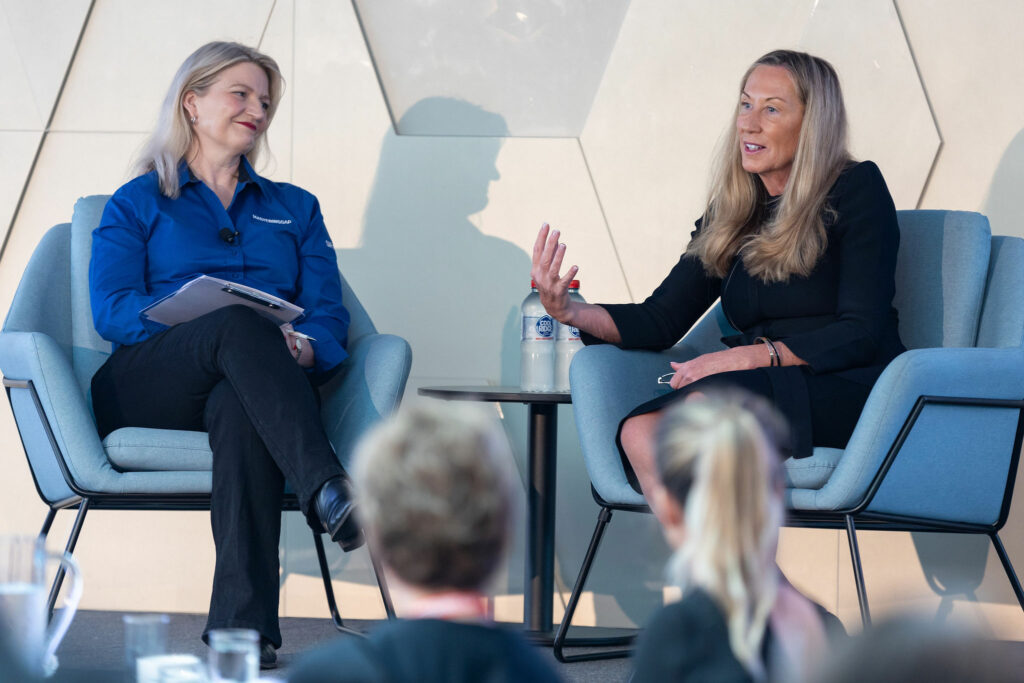“What is your superpower?”
You would be mistaken to think this is your guide to becoming the world’s next Wonder Woman. Rather, this is a snapshot into the Empowering Women in Supply Chain Breakfast session held at this year’s Mastering SAP EAM + Supply Chain & Procurement.
In a first ever for the event, the Empowering Women in Supply Chain Breakfast brought together professionals from various stages of their careers for a morning of insights and networking.
The plenary session featured keynote speaker Darcy MacLaren, global head of digital supply chain network and Annette Slunjski, CEO of Mastering SAP.
Slunjski kicked off the session by encouraging attendees to embrace the colorful coding around them, symbolizing a range of experience levels within the SAP world.
MacLaren was shortly welcomed to the stage, carrying over 10 years of experience in the SAP world and 30 years working in supply chain technology transformation. The founder of the Empowering Women in Supply Chain Network, shared her journey and perspective, underlining the critical role of visibility in the supply chain industry.
In Maclaren’s keynote, she encouraged all women that they are not in the land of misfits – rather a world where every woman has a superpower waiting to be uncovered.
Navigating digital transformation
According to MacLaren, companies in the supply chain industry are recognizing the need to digitize. She emphasized the value of getting started, even if the journey may differ for each organization.
She said: “My advice to customers is you need to have the big picture of where you’re trying to go and ultimately what your view is. But the most important thing is to get started.
“And there are certain trigger points in companies as to where they start when they digitize, that will vary. Where most people actually start is with sales and operation planning – integrated business planning is a great way to begin because it’s very strategic and it looks at your whole organization.”
When it comes to the digital transformation process, MacLaren argues that middle management is highly significant.
Slunjski asked MacLaren: “You’re on this transformation journey, where is the best place to start? And what matters more? People, process, technology?”
MacLaren said: “You need them all. And the best place to start usually is either what’s the highest value or what’s the most broken. Because my philosophy is if it ain’t broke, let’s not fix it. You need to have the big picture and then you look at, ‘this is our biggest area of value’”
The makings of a great supply chain professional
When asked by Slunjski what makes a great supply chain professional, MacLaren said: “It helps if you’re bright. It just helps because there’s a lot there. It’s complicated. If you’re quantitative, if you’re analytical, if you get things on the first time. You’re really at a disadvantage if it takes you long because there’s a lot of things going on.”
Other qualities, according to MacLaren, include a “can-do” attitude, being a problem solver and a good collaborator. She says that some statistics show that women do well in the supply chain industry as they tend to be “more collaborative”.
Slunjski went on to say: “The elephant in the room, and the conference is a good example of this. For the women in the room, if talent is really important, and you need to get some runs on the board, but, you’re faced with an industry that’s traditionally male dominated. As a senior executive, how do you ensure you’re encouraging this amazing talent to be part of your organization? And, if you’re someone who’s early to mid-career, how do you take that next step?”
MacLaren acknowledged the positive impact women bring to supply chain roles, emphasizing collaboration and strong interpersonal skills as key strengths.
She said: “I gladly mentor and sponsor all sorts of different talent. My advice to specifically women, is first of all, in your current job, do it well. Work hard. When you show up at a meeting, be more prepared than anybody else. Use the fact that you may be the only female in a room of 50, and use that opportunity to highlight. It’s easy to remember, the only woman.
“So when you’re in that opportunity, use it. Take an opportunity to make sure you say something, you contribute. The second thing is you’re better than you think you are.”
Dyslexia superpowers and finding your voice
MacLaren shared her experiences as a dyslexic thinker, emphasizing the value of diverse skill sets within teams who see dyslexia as a strength that aligns with a profound understanding of complex mathematical concepts, optimization and algorithms.
MacLaren believes what sets dyslexic thinkers apart is their high-level, visionary approach- focusing on the big picture, generating ideas and thinking outside the box. MacLaren’s journey into supply chain management was partly driven by the realization of this unique capability.
She said: “When I look for teams, because I’m a very big believer in diversity of teams, I will look individually as to what that person’s skill set is. And I’ve had some teams that people thought were land of misfit toys. Until they really understood.
“What is your superpower? You really have to kind of figure it out yourself at what you’re really good at. Usually it’s what you really like and you develop that and you do not worry about certain things that you’re not good at.”
Slunjski set the scene of an individual being in a room full of experienced professionals and finding their voice, asking MacLaren to elaborate on how they can find their voice.
“In finding your voice, I sometimes think you have to go back and be internal and reflect and go back to that quiet place and be really transparent and true to yourself as to what that voice is.”
MacLaren concluded by encouraging the room to be true to themselves and transparent. She asked them to evaluate their values and what they stand for in order to find that voice within.
The objective is clear – dig deep, find your superpower and let your presence be known in the SAP world.






